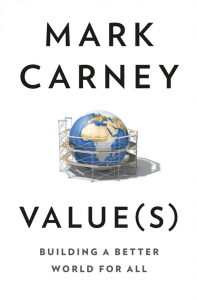Carney’s Strong Case for a Better Tomorrow

Value(s): Building a Better World for All
By Mark Carney
Penguin Random House Canada (2021)
Review by Paul Deegan
March 16, 2021
For those who were expecting a breezy light read from the former investment banker turned Rockstar of central bankers, Value(s), the 600-page tome by Mark Carney, will land with a heavy thud. But for those hoping for real values-based leadership and achievable solutions in a post-pandemic world, Carney delights, stimulates, and radiates the possibility of a better, more hopeful tomorrow.
To be sure, this is no vanity book banged out after a few sessions with a ghostwriter. Nor is there a flirtation with respect to any political ambitions of his own. As he turns 56 on March 16, he’s been Governor of the Bank of Canada and the Bank of England and is now advising the United Nations as special envoy on climate change, as well as the British government hosting the UN’s COP26 conference on climate change this summer in Glasgow. And this book is serious scholarship that reflects the intellect and humanity of a man who has been thinking and doing something about some of the most important questions of our time. It’s a profoundly important book that engages and challenges the reader.
The book, replete with rich around-the-world historical perspective, begins with a description of the Bank of England. Carney recounts that there are symbols of money and value everywhere. He notes that beneath his feet lie nine vaults with three-foot steel walls. They are filled with some 5,500 tons of bullion that the market values at over $180 billion, representing an astonishing five percent of all the gold that has ever been mined.
Carney’s book is an attempt to answer the following questions: What is value? How is it grounded? Which values underpin value? Can the very act of valuation shape our values and constrain our choices? How do the valuations of markets affect the values of our society? Does the narrowness of our vision, the poverty of our perspective, mean we undervalue what matters to our collective wellbeing?
It is also an attempt to respond to a challenge from Pope Francis. A few years ago, Pope Francis shared a parable during a luncheon Carney attended. The pontiff observed:
Our meal will be accompanied by wine. Now, wine is many things. It has a bouquet, colour and richness of taste that all complement the food. It has alcohol that can enliven the mind. Wine enriches all our senses.
At the end of our feast, we will have grappa. Grappa is one thing: alcohol. Grappa is wine distilled.
The Pope continued:
Humanity is many things – passionate, curious, rational, altruistic, creative, self-interested. But the market is one thing: self-interest. The market is humanity distilled.
And then he challenged Carney and the other attendees at the luncheon:
Your job is to turn the grappa back into wine, to turn the market back into humanity. This isn’t theology. This is reality. This is the truth.
Carney’s book is a historical examination of the relationship between value and values. It’s about turning the grappa back into wine. He defines values as the principles or standards of behaviour. He defines value as the regard that something is held to deserve.
He divides his thoughts into three parts. In Part I, he examines the various concepts and roots of value in political philosophy, economic theory and financial practice. Part II explores the crises of credit, COVID-19 and climate. Part III is Carney’s prescription for leaders, companies, investors, and countries. Based on his experience with the three crises of the 21st century, he asserts that the common values and beliefs that underpin a successful economy are:
- dynamism: to help create solutions and channel human creativity;
- resilience: to make it easier to bounce back from shocks while protecting the most vulnerable in society;
- sustainability: with long-term perspectives that align incentives across generations;
- fairness: particularly in markets to sustain their legitimacy;
- responsibility: so that individuals feel accountable for their actions;
- solidarity: whereby citizens recognise their obligations to each other and share a sense of community and society; and
- humility: to recognise the limits of our knowledge, understanding and power so that we act as custodians seeking to improve the commons good.
On leadership, Carney submits that there are five essential and universal attributes: Purpose. Perspective, Clarity, Competence, and Humility. While he clearly has those skills in spades, for those seeking clues to what’s next for Mark Carney, he offers few. What is clear is that he will play a leading role shaping and framing the debate about climate change, financial markets, and inclusive growth – both at home and abroad – for years to come.
Value(s) provides readers with much more than the retail price of $39.95 in value. It is a profoundly important book for the times by a big global thinker and change agent – a man of consequence who is living a life of purpose.
We Canadians are fortunate to have him back home among us, and I highly recommend this book for anyone looking for refreshing moral leadership and hopeful, ambitious policy. One can imagine Pope Francis smiling and raising a glass of wine after putting down this book and saying, “Salute!”
Policy Magazine Contributing Writer Paul Deegan is CEO of Deegan Public Strategies. He was an executive at BMO Financial Group and CN and served as deputy executive director of the National Economic Council in the Clinton White House.
